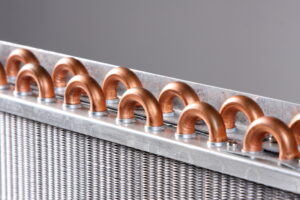
We’ve written before about refrigerant leaks in an air conditioner. The short version: they’re bad news. If left unrepaired, loss of refrigerant in an air conditioner will cause a chain of problems, starting with a rise in humidity and a drop in efficiency, culminating in the grand spectacle of the compressor burning out and you needing to purchase a new air conditioning system.
Fortunately, if you notice the signs of something going wrong with the AC and call us for air conditioning repair in Akron, OH, we can repair the trouble before it reaches these extremes. We’ll locate the leaks, seal them, and restore the lost refrigerant. To better understand when refrigerant refilling isn’t the answer, check out why your AC might not need a refrigerant refill.
Today, we would like to dig deeper into the refrigerant leak problem. Some people would like to know how leaks like this get started and if they can take steps to prevent them. Follow us below and we’ll examine the top reasons for refrigerant leaks.
Amateur repairs
Unfortunately, this one is common. Our technicians can tell plenty of horror stories about what they’ve discovered in ACs where non-professionals tinkered around. Homeowners who inherited their current air conditioner may have no idea their cooling system has sloppy, “homebrew” repairs waiting to make things worse. The poor repair job that often leads to refrigerant leaks is poor soldering on the joints of the refrigerant coils. The pressure of the refrigerant inside will soon tear open a weak solder. Another friendly reminder to only hire professionals!
A manufacturer’s fault
The major air conditioning manufacturers have high standards for their products—but nothing can stop some air conditioning units from rolling off the assembly line with defects. In fact, around 2% of ACs leave the factory with some type of fault. This is why you have a warranty. A common factory fault is thin copper tubing that’s prone to develop leaks after a few years.
Damage to the condenser
Look at the condenser cabinet of the AC sitting outside your house. Now imagine some kids playing baseball knocking a homerun ball right into it. Or somebody slamming the lawnmower into its side. Or a windstorm hurling branches, rocks, and other objects at it. All these can dislodge or damage the condenser coil, and presto! You have refrigerant leaks. If you’re unsure about what sounds to watch out for, review odd sounds from your AC and what they might mean to identify warning signs early.
Formaldehyde
Copper is corrosion-resistant but that doesn’t mean it’s corrosion-proof. A specific type of corrosion can occur in copper when it comes in contact with formaldehyde. Unfortunately, formaldehyde is a common chemical in homes that comes from a range of building materials and other products. The corrosion that starts (known as formicary corrosion) weakens spots of the copper to the point that pinhole leaks will open up to allow refrigerant to escape. This usually occurs within the indoor evaporator coil, and the liquid refrigerant will bubble out—a sound you might be able to hear. These leaks can start as early as five years into an AC’s service life. If you suspect leaks or water issues, also explore why water might be leaking from your AC and how to resolve it.
Please don’t hesitate to contact us when you experience concerns with your AC that may come from leaks. You don’t need to find the leaks yourself—you can leave all the hard work to us!
Call Crown Group Ohio: Your Comfort Experts Since 1963.


